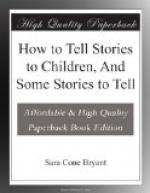And do you know, it was just as simple as ABC! Little Franz understood every word. It was just the same with the rest of the grammar lesson. I don’t know whether little Franz listened harder, or whether the master explained better; but it was all quite clear, and simple.
But as they went on with it, and little Franz listened and looked, it seemed to him that the master was trying to put the whole French language into their heads in that one hour. It seemed as if he wanted to teach them all he knew, before he went,—to give them all he had,—in this last lesson.
From the grammar he went on to the writing lesson. And for this, quite new copies had been prepared. They were written on clean, new slips of paper, and they were:—
France: Alsace.
France: Alsace.
All up and down the aisles they hung out from the desks like little banners, waving:—
France: Alsace.
France: Alsace.
And everybody worked with all his might,—not a sound could you hear but the scratching of pens on the “France: Alsace.”
Even the little ones bent over their up and down strokes with their tongues stuck out to help them work.
After the writing came the reading lesson, and the little ones sang their ba, be, bi, bo, bu.
Right in the midst of it, Franz heard a curious sound, a big deep voice mingling with the children’s voices. He turned round, and there, on the bench in the back of the room, the old blacksmith sat with a big ABC book open on his knees. It was his voice Franz had heard. He was saying the sounds with the little children,—ba, be, bi, bo, bu. His voice sounded so odd, with the little voices,—so very odd,—it made little Franz feel queer. It seemed so funny that he thought he would laugh; then he thought he wouldn’t laugh, he felt—he felt very queer.
So it went on with the lessons; they had them all. And then, suddenly, the town clock struck noon. And at the same time they heard the tramp of the Prussians’ feet, coming back from drill.
It was time to close school.
The master stood up. He was very pale. Little Franz had never seen him look so tall. He said:—
“My children—my children”—but something choked him; he could not go on. Instead he turned and went to the blackboard and took up a piece of chalk. And then he wrote, high up, in big white letters, “Vive la France!”
And he made a little sign to them with his head, “That is all; go away.”
THE STORY OF CHRISTMAS
There was once a nation which was very powerful, very fortunate, and very proud. Its lands were fruitful; its armies were victorious in battle; and it had strong kings, wise lawgivers, and great poets. But after a great many years, everything changed. The nation had no more strong kings, no more wise lawgivers; its armies were beaten in battle, and neighbouring tribes conquered the country and took the fruitful lands; there were no more poets except a few who made songs of lamentation. The people had become a captive and humiliated people; and the bitterest part of all its sadness was the memory of past greatness.




